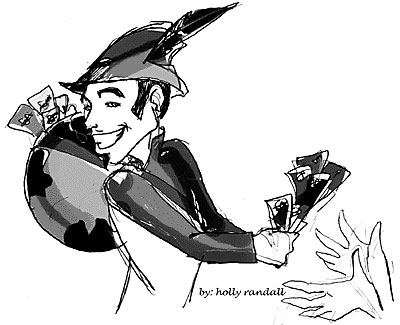
Illustration by Holly Randall
|
|
By Laura Keslar
Arizona Daily Wildcat
Tuesday, September 21, 2004
Print this
After this election, the one word I never want to hear again is the word tax, whether in its noun or verb form. But even if George Bush is re-elected and his version of the Gipper's trickle-down economics continues, that does not mean November 2nd is the last time we will hear about taxation. And I don't mean that we will continue hearing about taxes, because economists and political commentators are bemoaning the administration's "wayward" tax return policy.
Instead, we will be hearing the lack of coins jingling in our pockets and purses if yesterday's proposed global tax to the United Nations, presented by French and Brazilian Presidents Jacques Chirac and Luiz Inacio Lula da Silva, wins approval.
According to the proposal, the resulting funds will be used to fund the multi-national war on poverty, which has gained much support in the United Nations.
War on poverty. Sound familiar? It would if anyone remembered the 1960s and Lyndon B. Johnson's war on that elusive abstract noun. Shouldn't that war be over by now? Of course not. It is still being fought, kind of like Ronald Reagan's war on drugs. We tolerate the American war on poverty, though, because poverty needs to go the way of small pox, the mullet, and other awful '80s fashions.
So what is not to like about Chirac's proposal to significantly reduce the number of extremely poor people in the world by 2015? And by poor, I am not referring to the American poor who receive high-speed internet in Philadelphia or health care in Arizona where the poverty level is $18,400 for a family of four, which roughly translates into $12 per person per day.
Instead, Chirac's proposed war chest supposedly would go to help people living in extreme poverty, cutting in half the numbers of people around the world subsisting on less than a dollar per day.
As for his and the United Nation's war on poverty, Chirac's plan will not make a dent in the world except to enrage people who feel that it is an attack against their pocket books. The United States has been fighting this ongoing war now since the '60s, and it has cost over $8.9 trillion. Yet, we still have 12 percent of the population living below poverty level. And this is just for the United States' limited population of 293 million. Maybe, novel idea that it is, Jesus Christ was right - not that he was God, but that the poor will always be with us.
So, if Chirac thinks that his $50 billion proposal will make a dent in the number of extremely poor people, he has something coming to him. At best, it will help a few people or countries, making a limited impact on the world. At worst, it will turn into another scandal about which people will write scores of books as they have done with the many U.N. sex scandals.
Speaking of scandals, we are making a big assumption when we hope that the United Nations will direct these new funds to where they ought to be going. Look at what happened with the whole Food-for-Oil thing meant to alleviate the economic strains caused by the embargo placed against Iraq after the Gulf War. While the burdens placed against the Iraqi people were the fault of the United States, the resulting scandal was not.
The Food-for-Oil program has turned into one big fiasco where at least three senior U.N. officials stand accused of taking several million dollars worth of bribes from the now-defunct Saddam government. Evidence has been procured that even indicates that Saddam Hussein transferred into his personal bank account $5 billion that had originated from the Food-for-Oil program.
And these are the people whom the world trusts to fight poverty?
For a world leader, Chirac is rather naïve. Poverty is an issue that needs to be dealt with, but not by a redistribution of world income. While taking money from the rich and throwing it at the poor might make Jacques Chirac think he is Robin Hood, it is time to put aside the myth and realize that taxation at the hands of the United Nations is not the solution to the problem of poverty.
Laura Keslar is a pre-pharmacy junior. She can be reached at letters@wildcat.arizona.edu.
